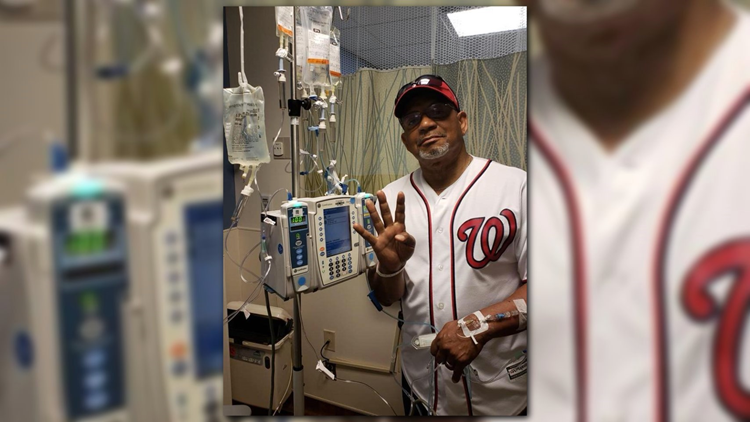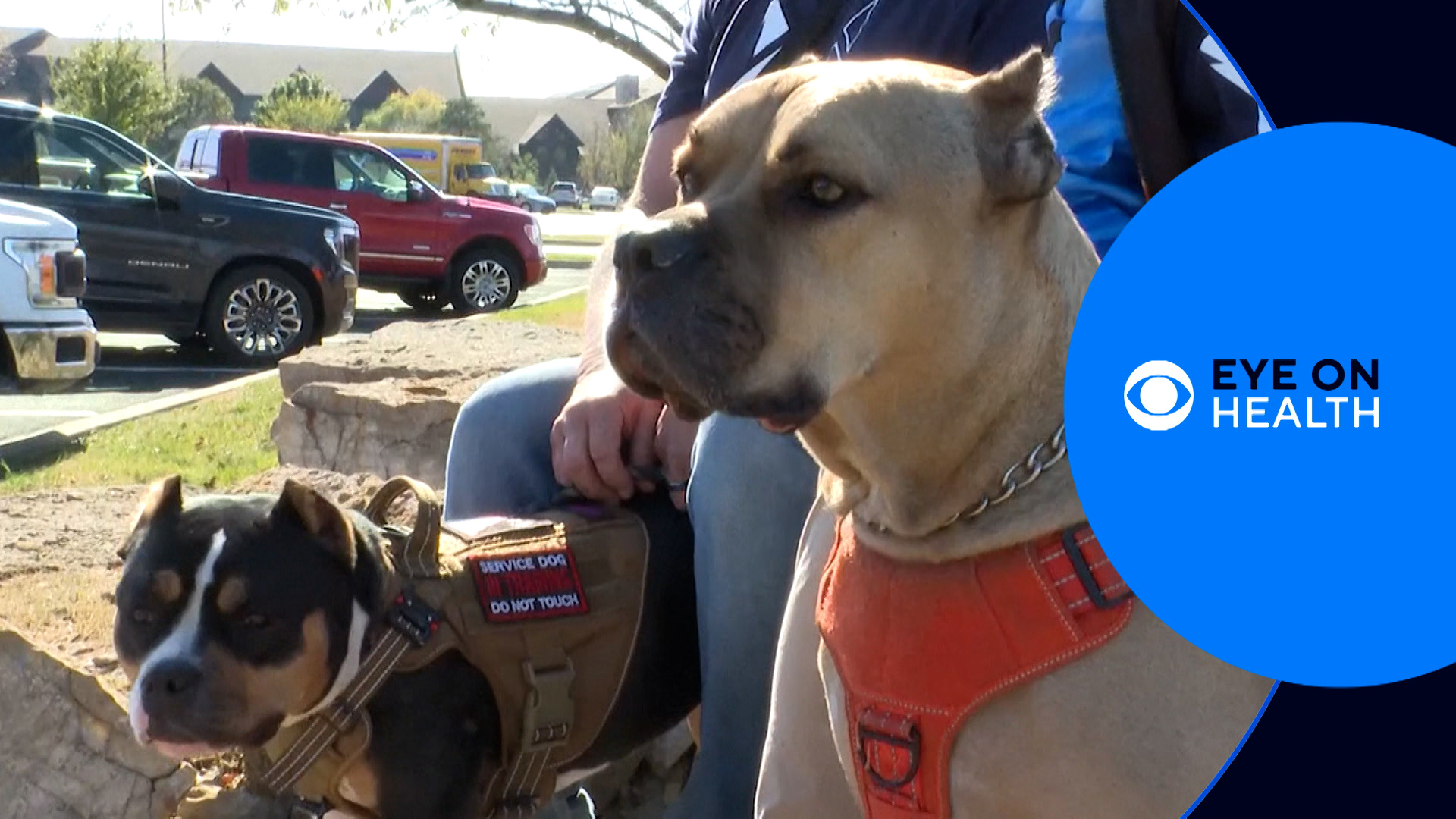Nobody wants to hear they have cancer; but, when WUSA9 anchor Bruce Johnson found out he had Non-Hodgkin lymphoma, a blood cancer, he said to himself, "Why not me?"
Almost immediately, Bruce took to social media to share the news. He also documented his journey. He did this to educate and dispel some of the myths and the fear of cancer. Especially in the minority community.
This is Bruce's journey of battling cancer and coming back:
How Bruce Discovered His Cancer
My first indication that something was wrong was I had a mass on my left tonsil that I had never seen before. I had a sore throat. This had been going on for some time, and finally I wasn't feeling good one morning and I told my wife I think I better go to Georgetown Hospital and check this out.
I was there like 6 hours because everybody who came in had a different diagnosis.
'No big deal.'
'We can put a needle in that and reduce this.'
'Nothing serious.'
And finally, I said to somebody, one of the interns, "Do you think this could be cancer?"
Bam: I was the first to suspect I had cancer. And I had not seen anything like it. And I knew that I felt differently. And I know my body.
So an ear nose and throat guy comes in and he looks at it. He says he's pretty sure he knows what it is. He thinks its some kind of oral cancer. So we do the biopsy and we do the CAT scan.The CAT scan comes back first. And now he's sure: It's cancer.
But then a few days later, the biopsy comes back and he's stunned that it's not oral cancer. It's not something he can cut out and then put me through chemotherapy. It's lymphoma, he says.
So he's out of the picture.
But he's already referred me to this other guy, Dr. Bruce Cheson. Who turns out to be a rock star for treating lymphoma at MedStar Georgetown University Hospital's Lombardi Comprehensive Cancer Center.
I never ever asked him what my chances were. Because I was afraid of the answer. I was afraid of what he might say.
I would be lying if I said I didn't think about dying. I would be lying if I said I was never scared.
But then after we discussed treatment and everything you do: Chemotherapy in 6 sessions, 3 or 4 weeks apart, I decided I can't do this by myself.
I decided I was going to put it out there on social media.
I'm not going to take my family through this, but I'll take you through it.
Might, maybe do some good, I thought.
I also knew there was a big community of cancer survivors out there. I had no idea how big.
Starting Treatment
When you go into the Lombardi Center everyone is very nice. People are all lined up on the
sides of the rooms. People on the sofa. Some people have lost their hair. Wearing caps and wigs.
There's very little conversation among us. You only talk with the person you come with.
And even then you look over at your wife, and there's not much to say,
What are you going to talk about?
There's no laughter.
We all know why we are there. And none of us know if we are going to get out. We don't know how this is going to turn out.
When I was going through chemotherapy my white blood cell count got low. Real low. And it's normal when you go through chemotherapy. Sometimes you have to be hospitalized. This stuff is powerful.
I was fortunate that I was able to go home but I wasn't able to do much. Dr. Cheson is right. You think after you make it through the first session, "Okay, I can do this." It's the set up before the take down.
It really at some point just takes you out. You don't want to get out of bed. I now know the difference between fatigue and tired. Tired, you get home early, take a nap. You're ready the next day. Fatigue you go home and go to bed. and you don't know when you might get up. You don't feel like doing anything. You don't want to talk to anybody. You don't have any appetite.
As much as they prepared me for chemotherapy, told me everything I would go through, it's a cumulative thing. You don't know until you go through it, that your body is just changing. It's being broken down.To the point that you might not come back up.
Meeting a Fellow Non-Hodgkin Lymphoma Patient During Chemo
There was one guy who really stood out to me, sitting right across from me and he had on all this
Pittsburgh Steelers' gear. I'm a burgundy and gold fan. What is with this guy?
We just started talking. His name is Sean Davis, Sr.
He said his son had gone to the University of Maryland and gone to Maret. And he was now playing for the Steelers.
We never talked about cancer. We never talked about Non-Hodgkin's lymphoma.
This was his third go around. And he's now stage 4.
We speak the same language. If you haven't been there you don't know what we are talking about. What we are really talking about is that we don't take days for granted. We don't plan the next 3 or 4 years.
He's part of my support group now. Hopefully I am part of his.
Cookies, Milk, Cartoons and Malcolm
One of the highlights, if you can call it that, of my dealing with lymphoma came from my young next door neighbor, Malcolm. Cute, smart kid.
He would come over to my house, ring the doorbell.
"Hey Bruce, just going to come in and look around for a while," Malcolm said.
"Okay, sure."
I showed him around and everything.
He liked my dog and we watched television. And then we ate cookies. And that wasn't one day. That was every day.
His Mom would text or call, "Is he over there? I didn't see him leave the house."
And if I didn't get to the door soon enough, the kid is leaning down on his knees and he's yelling into the mail slot, "Bruce, Bruce! Open the door. Open the door."
I don't think he had any idea how sick I was. I didn't want him to know how sick I was.
He's my buddy. We are friends.
Surrendering to Cancer
I heard from a lot of people on social media. Cancer survivors strong. And nobody said "Be tough. We've got this. We are going to kick cancer's ass."
All the slogans you see out there on social media, the bus stops. That's not how we approach this. Not how I approach it.
I surrendered to cancer. Kind of like a POW. Doesn't mean I don't want to live. It means I recognize whether or not I live is beyond my power. Totally dependent on a higher power who was operating through the doctor, Bruce Cheson, and the nurses and those drugs. And the outcome has already been decided. Whether I was going to live or not.
So I was just taking it an hour at a time. Day at a time.
Even now you don't get over cancer. You don't get beyond cancer. You get a reprieve from cancer. At least that's the way I look at it. Cancer is waiting for me down the road somewhere. At least that's the way I look at it. That's the only way I can look at it.
Role of Faith
I'm a person of faith. I believe prayers work. I felt the energy out there.Often when I didn't have any energy, I felt those prayers were working through the doctors and through the nurses and the staff.
When I first got cancer I went through that period where I thought "I don't deserve lymphoma."
But then I thought, maybe that's true but there are also a lot of good things I got that I didn't deserve either. So it all sort of evens out.
How Cancer Has Changed Bruce
I like to be in charge. I like to know the outcome. Sometimes before going through the process.
No one is entitled to that. It's called life.
But cancer will humble you. Not just once or twice. But everyday.,
A lot of things that were important, really important before I got cancer, not that important now. Really not that important now.
I'm doing the things I enjoy doing, and I don't put off a lot of things I enjoy doing.
One of the things about cancer is I don't spend a lot of time thinking about what life was like before cancer. That's lived and done. Some good times. Bad times. Great times.
This is a second chance to do some of the things you haven't done. To do things that you like, the things that you do well. Continue doing those. Learn to say no when you can't do things.
Pay less attention to pleasing people. Try to be a living example, which I think is the most difficult thing for us to do. Right?
RESOURCES:
Cancer Care
Email: info@cancercare.org
Website: www.cancercare.org
CancerCare is the leading national organization providing free, professional support services and information to help people manage the emotional, practical and financial challenges of cancer.
American Association For Cancer Research
Email: aacr@aacr.org
Website: www.aacr.org
Through its programs and services, the AACR fosters research in cancer and related biomedical science; accelerates the dissemination of new research findings among scientists and others dedicated to the conquest of cancer; promotes science education and training; and advances the understanding of cancer etiology, prevention, diagnosis, and treatment throughout the world.



